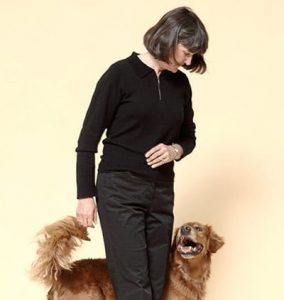Pursuing Excellence: When Did You Learn To Practice?
April 3, 2019By Connie Cleveland
My aunt came to visit me soon after I opened the Dog Trainers Workshop. She was trying to be supportive of her niece who had “gone into business for herself,” even if it was merely as a dog trainer. She came to the building and watched me spend 20 minutes training a dog. As I finished, she asked, “When will you do that again?”
“Tomorrow,” I replied.
“Tomorrow?” her tone was shocked. “Do you train every day?”
“I do.”
“That’s unbelievable,” she muttered, and returned to the house.
Growing up in a family of athletes, I always knew that to pursue excellence, practice occurred on a regular basis. We waited dinner until my father, the coach, got home from “practice.” My brother, involved in High School athletics, was always “at practice” after school. As a junior tennis player, the cheapest indoor court time was 6-7 am. So in the winter, when outdoor courts were unavailable, practicing before school started — at a time that some would see as unreasonable — was affordable.
Music was also an important part of our family, and practicing the piano was the first thing on my schedule when I got home from school.
I’ve mentioned in other articles significant mistakes I have made. I’ll mention another one here.
As a young obedience class instructor, I assumed that my students would go home and practice. It took an embarrassingly long time for me to realize that other people’s life experience and heritage, far different from my own, didn’t necessarily teach them how to do that.
We all believe that if we show up and meet the standards that a job requires, we will be paid. This transactional agreement is often learned at a young age. “Take out the trash and earn your allowance.” However, transactional relationships do not necessarily promote excellence.
Practice does.
That principle was what both my experience and heritage had taught me.
Artists, writers, musicians, athletes, etc., spend countless hours perfecting their skills, often with no guarantee of compensation. The long, often lonely hours, are spent practicing and perfecting their skill. The artist may paint the same object dozens of times to gain mastery. The musician plays a section of the same piece repeatedly until perfection is obtained.
In his book, Outliers, Malcolm Gladwell explains that reaching the 10,000-Hour Rule, which he considers the key to success in any field, is simply a matter of practicing a specific task for 20 hours of work a week for 10 years.
My father, the child of immigrants, fell in love with the game of tennis. As a young teenager, he would borrow a racquet from a neighbor and spend hours on the courts. After winning the Milwaukee City Championship, his father admonished him, “How do you think playing that game will ever put bread on the table?” Sadly, my grandfather did not live long enough to see his son become his only child to go to college and then spend his entire career as a tennis coach and instructor. He had easily reached his 10,000 hours.
When teaching me to play tennis, my father would break down my game into individual shots. He would have me practice 10 forehands “down the line,” followed by 10 forehands “crosscourt.” We didn’t just go out and play, but worked on all the component parts that my game required.
After one disappointing loss in a tournament, I complained to my father that my opponent had to be the luckiest player alive. I described some of the amazing shots she made and credited them to her good luck. He looked at me, smiling, and said, “The more you practice, the luckier you get.”
Just as my father honed in on the exact shots I needed to practice, my music teacher wrote in my practice notebook exactly what scales or pieces she wanted me to practice.
Using that model, I realized that I had made two faulty assumptions as an obedience instructor — first, that my students would automatically understand that they needed to practice, and secondly, that they would know how to practice the skills we had discussed in class. I started telling my students that they had to practice and I described for my students exactly what practice should look like. “Take your dog for a walk. On the walk, vary your speed. No matter what your speed, you must insist your dog walk on a loose leash.” Additionally, I started telling them how many repetitions I wanted them to practice, whether it was a simple sit-stay or a more complicated retrieve.
In retrospect, thinking about my aunt, I know she knew how to pursue excellence. No one in the family could make a better pie crust. She had made hundreds of pies. She had practiced her crust-making skill until it had become perfected — one that the entire family admired.
Athletics, art, music, dog training, cooking…proficiency requires practice. Practice is the key to pursuing excellence.
Connie Cleveland is a nationally-recognized dog trainer recognized for her work with family dogs and dogs involved in obedience and field trial competitions, as well as dogs exhibiting challenging behavioral problems. She is also the owner of the Dog Trainers Workshop, a spacious training and boarding facility for dog lovers featuring an indoor training facility, an outdoor agility ring, and a boarding kennel set on 14 acres with a pond and walking trail. Cleveland’s eleven obedience trial championship dogs include her dog Eli, the first Golden Retriever to earn both field and obedience championships, and her dog Ezra, the only Labrador to have earned an obedience trial championship, a field championship, and an amateur field championship. To learn more about Dog Trainers Workshop or to reach Connie, see https://www.dogtrainersworkshop.com or https://www.facebook.com/DogTrainersWorkshop.





















